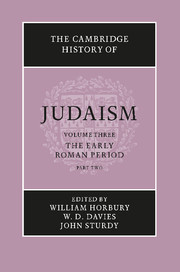Book contents
- Frontmatter
- 1 The archaeology of Palestine 63 bce–ce 70
- 2 The Herodian Temple
- 3 Recent archaeology in Palestine: achievements and future goals
- 4 The contribution of Jewish inscriptions to the study of Judaism
- 5 The social, economic and political history of Palestine 63 bce–ce 70
- 6 The Diaspora in the Roman period before ce 70
- 7 The Gentiles in Judaism 125 bce–ce 66
- 8 Gentiles as seen by Jews after ce 70
- 9 The synagogue
- 10 The Temple and the synagogue
- 11 The early liturgy of the synagogue
- 12 Women in the synagogue
- 13 The Pharisees
- 14 The Sadducees – their history and doctrines
- 15 The Essenes
- 16 The baptist sects
- 17 The troublemakers
- 18 The Samaritans and their sects
- 19 Galilean Judaism and Judaean Judaism
- 20 Jesus: from the Jewish point of view
- 21 Paul: from the Jewish point of view
- 22 Jewish Christianity
- 23 Apocalyptic: the disclosure of heavenly knowledge
- 24 The Qumran sectarian writings
- 25 The Dead Sea Scrolls and pre-Tannaitic Judaism
- 26 Prayer in the Qumran Texts
- 27 Philo of Alexandria
- 28 Josephus (ce 37–c. 100)
- 29 The rabbi in second-century Jewish society
- 30 The Hellenistic–Roman Diaspora ce 70–ce 235: the archaeological evidence
- 31 The legacy of Egypt in Judaism
- 32 Jewish elements in gnosticism and magic c.ce 70–c.ce 270
- Bibliographies
- Index
- References
13 - The Pharisees
Published online by Cambridge University Press: 28 March 2008
- Frontmatter
- 1 The archaeology of Palestine 63 bce–ce 70
- 2 The Herodian Temple
- 3 Recent archaeology in Palestine: achievements and future goals
- 4 The contribution of Jewish inscriptions to the study of Judaism
- 5 The social, economic and political history of Palestine 63 bce–ce 70
- 6 The Diaspora in the Roman period before ce 70
- 7 The Gentiles in Judaism 125 bce–ce 66
- 8 Gentiles as seen by Jews after ce 70
- 9 The synagogue
- 10 The Temple and the synagogue
- 11 The early liturgy of the synagogue
- 12 Women in the synagogue
- 13 The Pharisees
- 14 The Sadducees – their history and doctrines
- 15 The Essenes
- 16 The baptist sects
- 17 The troublemakers
- 18 The Samaritans and their sects
- 19 Galilean Judaism and Judaean Judaism
- 20 Jesus: from the Jewish point of view
- 21 Paul: from the Jewish point of view
- 22 Jewish Christianity
- 23 Apocalyptic: the disclosure of heavenly knowledge
- 24 The Qumran sectarian writings
- 25 The Dead Sea Scrolls and pre-Tannaitic Judaism
- 26 Prayer in the Qumran Texts
- 27 Philo of Alexandria
- 28 Josephus (ce 37–c. 100)
- 29 The rabbi in second-century Jewish society
- 30 The Hellenistic–Roman Diaspora ce 70–ce 235: the archaeological evidence
- 31 The legacy of Egypt in Judaism
- 32 Jewish elements in gnosticism and magic c.ce 70–c.ce 270
- Bibliographies
- Index
- References
Summary
In rabbinic tradition, the Pharisaic sages are described as the successors of the men of the ‘Great Synagogue’ and, ultimately, of Moses: ‘Moses received the Law from Sinai and committed it to Joshua, and Joshua to the elders, and the elders to the Prophets; and the Prophets committed it to the men of the Great Synagogue. They said three things: be deliberate in judgement, raise up many disciples, and make a fence around the Law.’ Following this introduction, the Mishnah commemorates famous sages, from Simeon the Just and Antigonus of Sokho down to Rabban Simeon ben Gamaliel. Committed to writing well after ce 70, this short ‘history’ of the Sages enabled the rabbis to make sense of and systematize the development of Jewish religious teaching in the aftermath of the catastrophe. Thus, m. Av. 1 may serve as the starting point of an inquiry into the history of Pharisaism, but not as its blueprint.
Before we can embark on our task, a few words concerning our sources are called for. The ‘classic’ texts which have been used by critical scholarship to reconstruct the history of Pharisaism are the works of Josephus, the New Testament and rabbinic works such as the Mishnah, the Tosefta, Tannaitic passages in both the Babylonian and the Jerusalem Talmuds and Tannaitic midrashim. To these we can now add, thanks to the discovery of the Qumran library, 4qpNah, 1qpHab, 4qpPs37, 4qTest, 11qt and, most importantly, 4qmmt. To a certain degree, 1 and 2 Maccabees and the Psalms of Solomon can also assist our reconstruction.
- Type
- Chapter
- Information
- The Cambridge History of Judaism , pp. 402 - 427Publisher: Cambridge University PressPrint publication year: 1999
References
- 2
- Cited by

